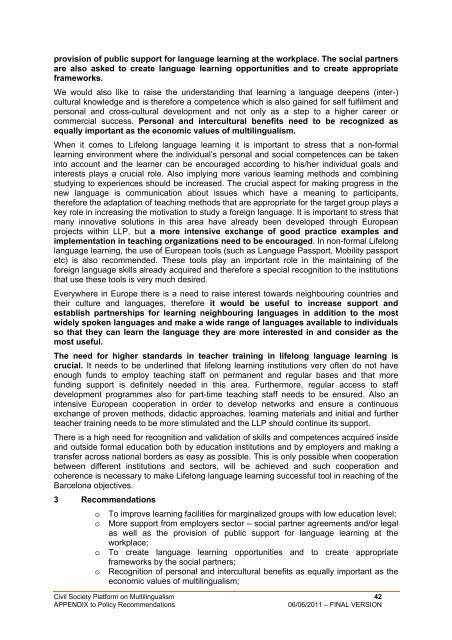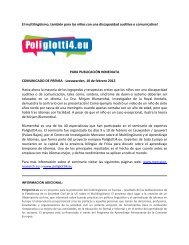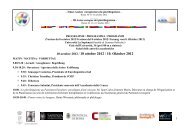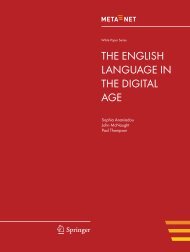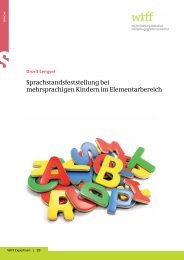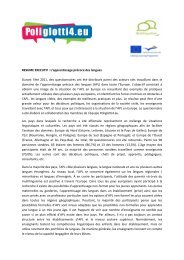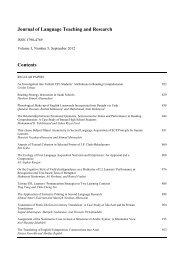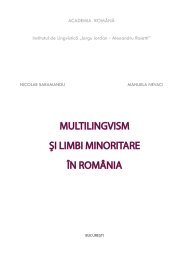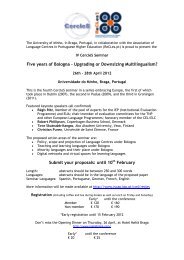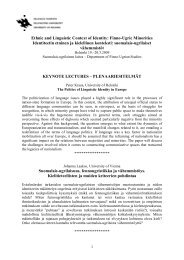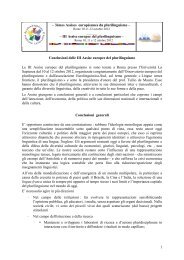FULL VERSION - European Commission - Europa
FULL VERSION - European Commission - Europa
FULL VERSION - European Commission - Europa
Create successful ePaper yourself
Turn your PDF publications into a flip-book with our unique Google optimized e-Paper software.
provision of public support for language learning at the workplace. The social partnersare also asked to create language learning opportunities and to create appropriateframeworks.We would also like to raise the understanding that learning a language deepens (inter-)cultural knowledge and is therefore a competence which is also gained for self fulfilment andpersonal and cross-cultural development and not only as a step to a higher career orcommercial success. Personal and intercultural benefits need to be recognized asequally important as the economic values of multilingualism.When it comes to Lifelong language learning it is important to stress that a non-formallearning environment where the individual’s personal and social competences can be takeninto account and the learner can be encouraged according to his/her individual goals andinterests plays a crucial role. Also implying more various learning methods and combiningstudying to experiences should be increased. The crucial aspect for making progress in thenew language is communication about issues which have a meaning to participants,therefore the adaptation of teaching methods that are appropriate for the target group plays akey role in increasing the motivation to study a foreign language. It is important to stress thatmany innovative solutions in this area have already been developed through <strong>European</strong>projects within LLP, but a more intensive exchange of good practice examples andimplementation in teaching organizations need to be encouraged. In non-formal Lifelonglanguage learning, the use of <strong>European</strong> tools (such as Language Passport, Mobility passportetc) is also recommended. These tools play an important role in the maintaining of theforeign language skills already acquired and therefore a special recognition to the institutionsthat use these tools is very much desired.Everywhere in Europe there is a need to raise interest towards neighbouring countries andtheir culture and languages, therefore it would be useful to increase support andestablish partnerships for learning neighbouring languages in addition to the mostwidely spoken languages and make a wide range of languages available to individualsso that they can learn the language they are more interested in and consider as themost useful.The need for higher standards in teacher training in lifelong language learning iscrucial. It needs to be underlined that lifelong learning institutions very often do not haveenough funds to employ teaching staff on permanent and regular bases and that morefunding support is definitely needed in this area. Furthermore, regular access to staffdevelopment programmes also for part-time teaching staff needs to be ensured. Also anintensive <strong>European</strong> cooperation in order to develop networks and ensure a continuousexchange of proven methods, didactic approaches, learning materials and initial and furtherteacher training needs to be more stimulated and the LLP should continue its support.There is a high need for recognition and validation of skills and competences acquired insideand outside formal education both by education institutions and by employers and making atransfer across national borders as easy as possible. This is only possible when cooperationbetween different institutions and sectors, will be achieved and such cooperation andcoherence is necessary to make Lifelong language learning successful tool in reaching of theBarcelona objectives.3 Recommendationso To improve learning facilities for marginalized groups with low education level;o More support from employers sector – social partner agreements and/or legalas well as the provision of public support for language learning at theworkplace;o To create language learning opportunities and to create appropriateframeworks by the social partners;o Recognition of personal and intercultural benefits as equally important as theeconomic values of multilingualism;Civil Society Platform on Multilingualism 42APPENDIX to Policy Recommendations06/06/2011 – FINAL <strong>VERSION</strong>


